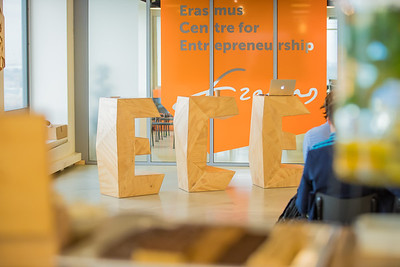Entrepreneurial teaching and learning at Erasmus University Rotterdam
Around 800 bachelor students from Rotterdam School of Management, Erasmus University (RSM) explored entrepreneurship and new business models in our adapted online learning environment. The RSM Entrepreneurship Challenge challenges students to develop a value proposition and turn their idea into an innovative and profitable company. During biweekly online feedback sessions, we support the students to put the lessons on entrepreneurship into practice.
The students have been working on their businesses as part of the RSM Business Administration course Entrepreneurship. In the annual RSM Entrepreneurship Challenge, we link academic knowledge to practice, giving the students insights into how to start and run a business. The bachelor students learn about entrepreneurship-related topics, including ideation, customer discovery, value proposition, business models and pitching. The course enables students to experience what it is like to create maximum value from limited resources, by thinking and acting like an entrepreneur.
Learning from Dutch Scale-up entrepreneurs
Founder and CEO of Coolblue, Pieter Zwart, showed the students a peek in the life of a scale-up entrepreneur by sharing the Coolblue Teaching Case. As part of our Erasmus Trust Fund project that stimulates entrepreneurship education at the Erasmus University Rotterdam, we developed together with the Case Centre multiple real-life teaching cases on the growth of Dutch scale-ups. The purpose of these teaching cases is to turn exceptional business and management experiences into powerful learning tools that can be implemented in our entrepreneurship courses. One of the initiators of the teaching cases, Professor Dr. Justin Jansen, describes the importance of translating his research into education: ‘The teaching cases are a great source of inspiration for the students. They learn what it means to develop new revenue models and to look at customer needs in a different way. Not only the deployment of rapid growth, but certainly also the challenges that comes with it are key to this end.”
New circumstances
After examining entrepreneurship from both an academic and practical perspective, the students put everything into practice and started building their own company. Given the corona crisis, the students were forced to adjust their business idea and come up with new ways to deal with current business changes. Our coaches in the feedback sessions challenged the students to come up with ideas that were both innovative and sustainable for the future, in terms of analyzing its future market potential and preparing for a post-crisis.
Ultimately, three final teams (out of 160) with the most desirable, viable and feasible business model will be selected to pitch their ideas and be showcased online.
